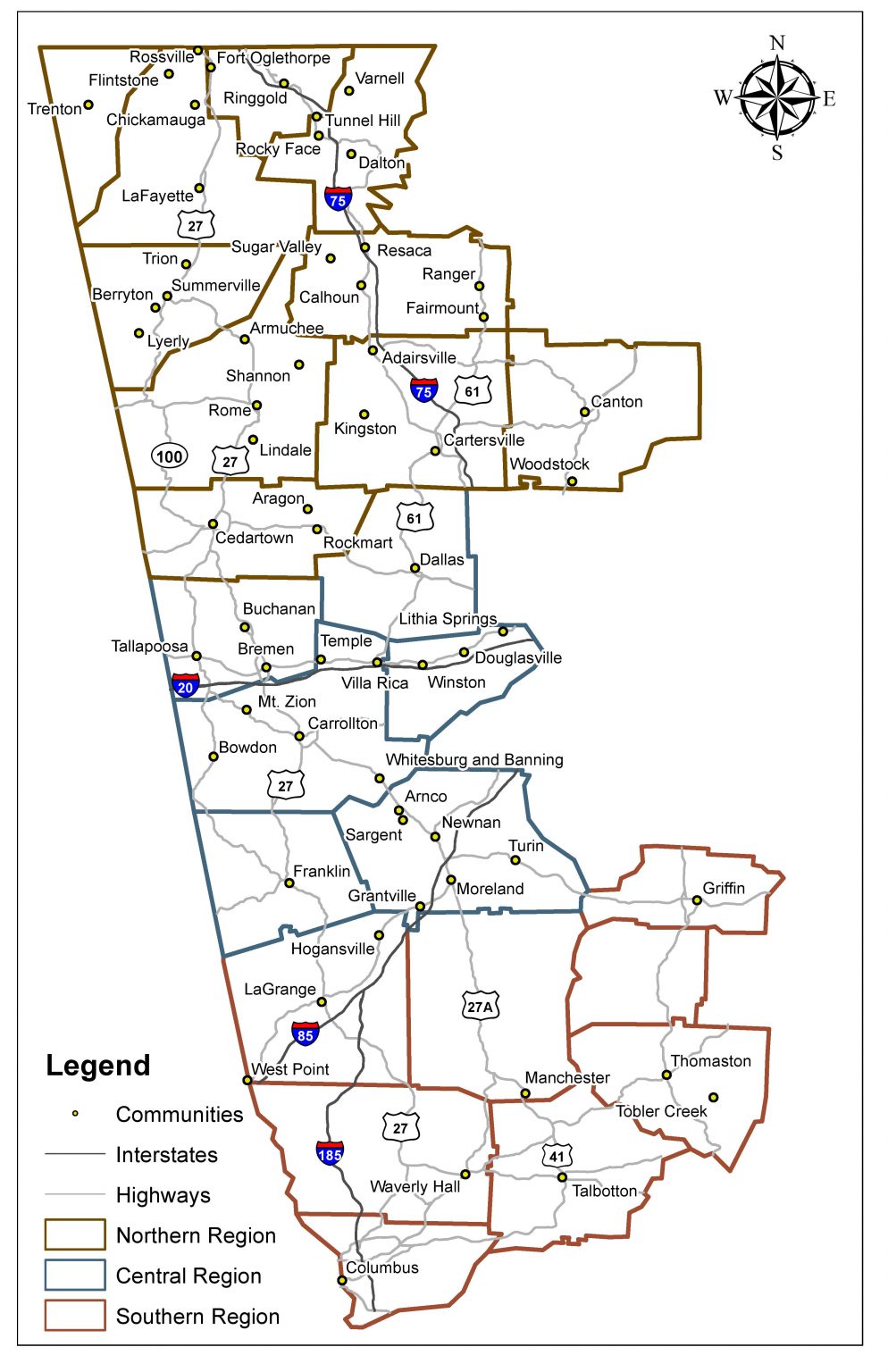Reminiscing Riverdale
Exploring Canton’s Textile History

Reminiscing Riverdale: Canton’s Textile History
Sites to See Along the Trail:
[expand title=”1. Canton Cotton Mill #1: 141 Railroad St., Canton, GA, 30114″]In 1899, prominent Canton citizens raised funds to build Canton Cotton Mills. R.T. Jones, the mill’s first president, received a charter to build the mill in the southwestern corner of Canton near Railroad Street. The mill was designated Canton Cotton Mill #1 after the creation of Canton Cotton Mill #2 just one mile away in 1923. This mill created an array of products ranging from the famous “Canton denim” to osnaburg fabric during World War II to scrub denim in the late 1960s. During the decline of the textile industry in the city, Canton Cotton Mill #1 had largely become a storage facility for the mill and no longer produced any material before it closed in the late 1970s. The mill is now home to several active businesses and a church.[/expand]
[expand title=”2. Canton Cotton Mills #1 Office Building: 221 W. Main St., Canton, GA, 30114″]This building served as the center for all of the administration needs for Canton Cotton Mills. The building is located just a short walk from Canton Cotton Mill #1. Canton Cotton Mills, during the post-strike years, introduced computerized accounting methods in an effort to stay competitive with overseas markets. Today, the former mill office building houses several businesses.[/expand]
[expand title=”3. Jones Mercantile Store: 130 E. Main St., Canton, GA, 30114 “]Jones Mercantile’s history intertwines with mill life in Canton Cotton Mills and its mill villages. Operated by the founding president’s son, Paul W. Jones, Jones Mercantile Store served the mill workers as well as the residents of Canton in general. As a general store, the products sold ranged from hardware supplies to groceries to furniture and even cars. Mill workers were able to purchase goods on credit if needed and cash their paychecks. The store closed in the 1980s.[/expand]
[expand title=”4. Riverdale Mill Village #1: Entrance on North St. & Riverdale Circle, Canton, GA, 30114″]It was common for cotton mill companies to build housing for its workers near the mill. Originally, houses in this mill village rented for $5 each month and Canton Cotton Mills provided all maintenance. residents even had a small amount of land to keep a garden or chickens in their yards. Near Riverdale Church, located within the mill village, there was a communal barn for residents to keep livestock. During the 1960s, the mill houses were sold to the current mill worker residents. Riverdale is still an active neighborhood today. Please respect the privacy of its current residents when viewing. [/expand]
[expand title=”5. Riverdale Baptist Church and Riverdale School: 15 Riverdale Circle, Canton, GA, 30114″]Riverdale Baptist Church and Riverdale School, served the spiritual and educational needs of the surrounding mill village residents. Riverdale Baptist Church and Riverdale School shared a building until the school closed in 1939. Canton Cotton Mills provided the building maintenance and salaries of the pastor and schoolteachers. In 1969, the church congregation purchased the building from the mill.[/expand]
[expand title=”6. Canton Cotton Mill #2: 550 Riverdale Pkwy., Canton, GA, 30114″]After the success brought by Canton Cotton Mill #1 and its “Canton denim,” a nationally known product, R.T. Jones was able to start a second mill at a nearby location. Canton Cotton Mill #2 opened in May of 1923, one mile north of Canton Cotton Mill #1. The new mill was much larger than the first mill and employed 600. The mill remained in operation until the Canton Cotton Mills location closed in 1981. [/expand]
[expand title=”7.Canton Cotton Mill Village #2: Entrance at the intersection of Center St. & Juniper St., Canton, GA, 30114″]A second, larger mill necessitated another mill village. Mill village #2 was much larger than the one downtown. The company built modern homes in a paid period by using a method derived from Henry Ford’s use of the assembly line production. Building each house very similarly, cut down on added costs and increased efficiency of construction. The modern amenities within these homes included indoor plumbing, running water, and electricity. Similar to Riverdale, it is still an active neighborhood.[/expand]
Email the Trail at wgtht@westga.edu or call UWG Center for Public History at 678-839-6141 for more information.













